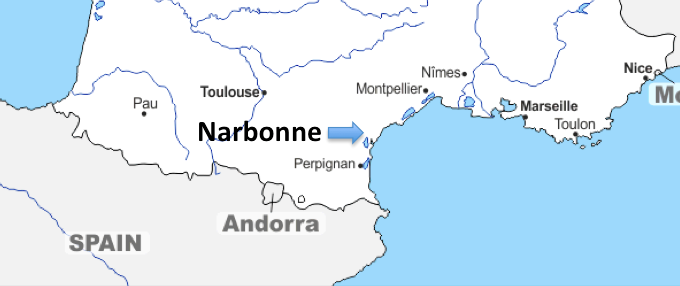
A European Journey #26 – Narbonne (France)
The summer holidays are starting. And this is a time for travelling for many Europeans. And since we’ve been going through our European Journey since January, let me suggest that we take a mini-trip within the Journey. During the coming weeks, I propose to visit some of the locations were the Waldensians had an impact before the Reformation.
If you have followed the earlier episodes, you may remember that I talked about the beginnings of the Waldensian Reformation in Lyon in the twelfth century. Waldo, its precursor, emphasized lay preaching, the primacy of Scriptures and the vow of poverty, which eventually led him and his followers to be expelled from the city. Instead of bringing the movement to its death, this expulsion actually gave rise to one of the most amazing missionary movements of the Middle Ages.
The Waldensian movement not only contributed to spreading the Scriptures in Europe, it also contained some key elements that became the building blocks of modern Europe, as I’ll seek to explain in the following stages.
So the first stage of our mini-trip will be the French city of Narbonne, which is nearly 400 km Southwest from Lyon. The city is located near the Mediterranean Sea and the Catalonian Pyrenees.
Narbonne was established in 118 BC by the Romans who later made it the capital of the province of Gallia Narbonensis, which corresponds roughly to the Southern part of France. Today, we can find traces of its Roman past in an archaeological museum, for example.
But to find traces of the Waldensians, we must visit the historical centre of Narbonne. There we find the Gothic Cathedral and the Archbishops’ palace made of a combination of Romanesque and Gothic styles. These buildings remind us that Narbonne was once the seat of an archbishopric in medieval times. And many provincial church councils were also held here.
In the twelfth century, a heresy called Catharism had spread in Southern France. This was a belief based on two opposite deities: a good god who was the creator of the spiritual world, and an evil god who was the creator of the material world. Many nobles in the region had become Cathars. This obviously raised deep concerns in the Catholic church, which had controlled the region since the fifth century.
The numerous church councils declaring Catharism heretical couldn’t stop it from spreading in Europe. In Southern France, the Cathars had a well-established church. They even trained missionaries to spread their beliefs to other parts of Europe.
It was in these conditions that the Waldensians arrived in the region. Since they had also been banished by the Catholic Church, their arrival was welcomed by the Cathars. Nevertheless, the Waldensians held on to their Evangelical beliefs. Noticing the difference of lifestyles between the two groups, the Catholic clergy even said about the Waldensians: “They are bad, but comparatively to other heretics, they are a lot less bad!”
The Waldensians soon began to have a strong impact on the public opinion, and their faith even reached the nobility.
One provincial Church Council held in the historical centre of Narbonne dealt specifically with the Waldensians. The main charge held against them was obviously lay preaching. The Catholic hierarchy knew that this practice had the potential to remove their grip on the population.
Actually, there are written accounts of the debates, which show how firm the Waldensians were in their faith.
For example, when the clergy told them that, according to the Scriptures disobedience to the authorities deserved eternal death, they answered: “If the bishops and priests obeyed the Word of God, you would be right. But since they disobey – themselves in the first place – we must choose between these two ways: obeying God and disobeying the Church, or obeying the Church and disobeying God. All things considered, we have thought that the only position to follow is that which the apostle Saint Peter took in a similar case: ‘Better to obey God than men’. Hence, if we do not walk with you, it is so that we do not renounce the way of obedience.”
Against the accusation of preaching under a spirit of dispute, the Waldensians answered: “Let us agree with you for a while that our dispositions are as you say. The case would then be settled by what Paul said to the Philippians (1:15-18): ‘It is true that some preach Christ out of envy and rivalry, but others out of goodwill. The latter do so out of love, knowing that I am put here for the defense of the gospel. The former preach Christ out of selfish ambition, not sincerely, supposing that they can stir up trouble for me while I am in chains.” From all of this, what does the apostle now conclude? ‘But what does it matter? The important thing is that in every way, whether from false motives or true, Christ is preached. And because of this I rejoice.’ Could you not rejoice as well? It seems that you are jealous!”
This conversation shows how lay people were well-versed in the Scriptures, even in a time when the masses were usually uneducated. This also reveals that the Waldensian movement was also a forerunner of universal education in Europe.
Sadly in the beginning of the thirteenth century, the Dominicans sent by Pope Innocent III massacred the Waldensians along with the Cathars. Some Waldensians survived in remote areas of the region, where new Reformation movements actually arose in the following centuries.
But as we’ll see next week, Narbonne is not the only place where we find traces of the Waldensians.
See you next week somewhere else in Europe.
Cédric Placentino
Schuman Centre convener for Italian and French Europe
Follow A European Journey here.

This Post Has 0 Comments